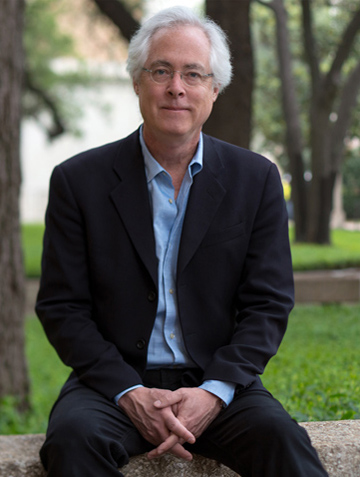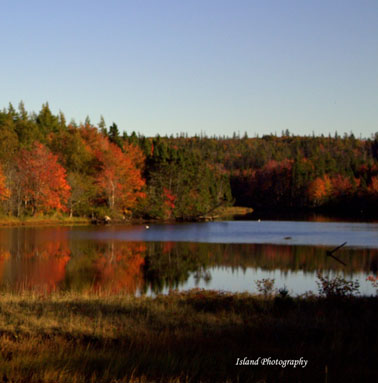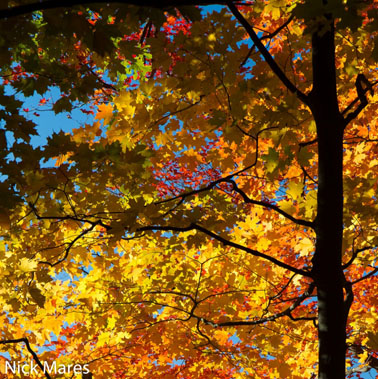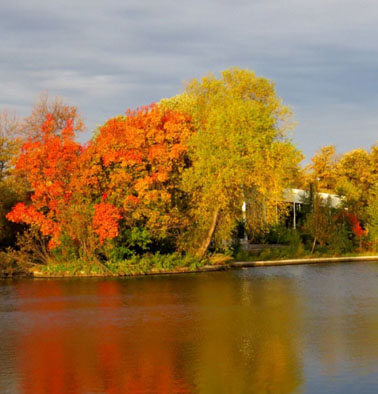Recovering from the 2015 Canadian election with Louis Menand .. and the Cold War in New York, 1947—1967
Oct 25th, 2015 | By Randall White | Category: In Brief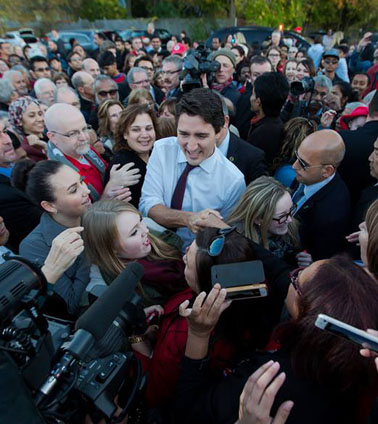 You have to do something … to unwind mentally and readjust to ordinary life, after all the raw excitement of a historic democratic campaign (well … that’s what we think up here in this now all-red city [aka blue in the USA] Â … Â still trying in vain to emulate Manhattan …)
You have to do something … to unwind mentally and readjust to ordinary life, after all the raw excitement of a historic democratic campaign (well … that’s what we think up here in this now all-red city [aka blue in the USA] Â … Â still trying in vain to emulate Manhattan …)
So …  to  recover from the October 19 Canadian federal election of 2015 I went to three lectures by “Louis Menand, the Pulitzer Prize-winning New Yorker writer and Harvard English professor.” They were held at 4:30 in the afternoon in Room UC140, University College (on the University of Toronto main campus, just by Soldiers’ Tower), October 21, 22, and 23.
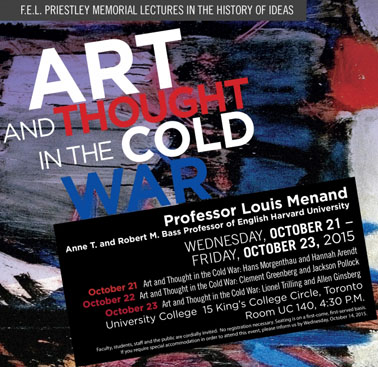 The overarching theme was “ Art and Thought in the Cold War.” More exactly, Mr. Menand does not waste time on vague generalities – as already known to readers of his prize-winning The Metaphysical Club: A Story of Ideas in America, first published in 2001, but broadly about USA/New England 1870—1930.
The overarching theme was “ Art and Thought in the Cold War.” More exactly, Mr. Menand does not waste time on vague generalities – as already known to readers of his prize-winning The Metaphysical Club: A Story of Ideas in America, first published in 2001, but broadly about USA/New England 1870—1930.
“Art and Thought in the Cold War” – apparently an excerpt from a larger work in progress – seemed to be about USA/New York, 1947—1967. To illuminate this time and place, the piece of the larger work presented at University College’s  F.E.L. Priestley Memorial Lectures offered sometimes interwoven biographical sketches of three pairs of artists, academics, critics, writers, and so forth – Hans Morgenthau and Hannah Arendt (October 21), Clement Greenberg and Jackson Pollock (October 22), and Lionel Trilling and Allen Ginsberg (October 23).
Meanwhile, key current hits on this website were reminding me that someone wrote, just this past April : “certain sides of the country today – present in all regions, both official languages, and almost all cultural groups – are almost literally thirsting for some vaguely hip new political leadership, that will make various Canadian locations look good again in the eyes of the global village … Justin Trudeau, almost just by his photograph, at least suggests the image of a politician who can slake this particular thirst among the diverse populace.”
And I kept on wondering. What would Hannah Arendt or Jackson Pollock or Allen Ginsberg have made of that? Has it anything to do with Lionel Trilling’s signature book of 1950 on The Liberal Imagination? Or Clement Greenberg’s “Avant-Garde and Kitsch” in 1939? Or Hans Morgenthau’s classic realist US foreign policy textbook of the 1950s and 1960s, Politics Among Nations: The Struggle for Power and Peace?
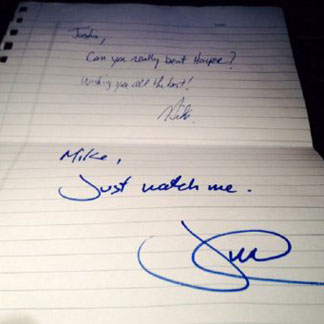
A note exchanged between fellow Porter Airlines passengers Michael Kydd and Justin Trudeau in 2013, recently sold on eBay for $12,301. Justin Trudeau’s father had said “Just watch me!” when asked by a reporter how far he would go in combating separatist terrorism during the 1970 October Crisis.
In the end I couldn’t come to any exact conclusions. But I finally felt ready to deal with the new Canadian political facts of late October 2015 – including how Margaret Trudeau was telling us on the radio that the infrastructure at 24 Sussex needs vast renovation, probably right away.
(And, whatever else, I find it refreshing myself to read such headlines as “Premiers meet by phone, agree to attend Paris climate summit with Trudeau,” or “Trudeau invites May, other leaders to join UN climate summit delegation,” or even “Justin Trudeau’s ‘Just watch me’ note fetches $12,301 on eBay.” And, from the sordid depths of American feminism today : “Canada’s hot new prime minister has the Internet sweating maple syrup,” or “Canada’s new prime minister is so bangable Americans might start caring about Canadian politics” … mmm .. we all know that’s not too bloody likely … you have to care about your own politics first … but … !)
Swearing in and new cabinet on Wednesday, November 4, 2015
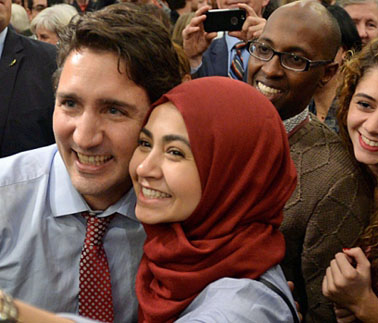
Prime minister elect Justin Trudeau poses for selfie with supporter at welcome rally in Ottawa on the day after the election. Photo : Sean Kilpatrick/Canadian Press.
As explained by the Toronto Star : Justin “Trudeau has set Nov. 4 as the day he will name his cabinet, giving Canadians a sense of what shape the Liberal government will take. Trudeau and his ministers will be sworn in. By that point, it’s expected Trudeau will set a date for the return of the House of Commons, where the Conservatives under an interim leader will replace the NDP as the Official Opposition. New Democrats will be the third party.”
For more technical and political detail on all this, see : “The Swearing-In of a New Ministry” ; “Justin Trudeau’s team begins transition to power” ; “How Justin Trudeau will officially become prime minister” ; and “Cabinet-making: Who’s on Trudeau’s shortlist.”
My only serious thought here is largely whimsical (but also possibly deeply interesting … well, maybe?). It turns around the date November 4. As it happens the night of November 4, 1981 – Â 34 years ago now – Â is what some in Quebec still remember as “the night of the long knives.”
To quote from a reliable enough Wikpedia article : “That night–November 4, 1981–the Minister of Justice, Jean Chrétien, met with Attorney General of Saskatchewan Roy Romanow and Attorney General of Ontario Roy McMurtry in the kitchen of Ottawa’s Government Conference Centre. The premiers discussed a scenario in which the provinces would agree to the charter and disallowing opting-out with compensation, while Chrétien agreed to the Vancouver amending formula and reluctantly offered to include the Notwithstanding Clause in the constitution …  working with the draft proposal created by the Newfoundland delegation, the nine groups worked through the night to prepare the compromise proposal …”
It remains a problem today that Quebec, then still under the separatist provincial government of  René Lévesque, was not involved in these “Kitchen Cabinet” negotiations. The Lévesque government refused to “sign on” to what finally became the Constitution Act, 1982, with its crucial Canadian Charter of Rights and Freedoms (which in 2015 “more than 90 per cent of us, when asked,” identify as an “important symbol of Canadian identity.”) And getting Quebec’s formal signature on the present Canadian constitution at last, so to speak, remains a key objective of any future federal-provincial constitutional discussion.
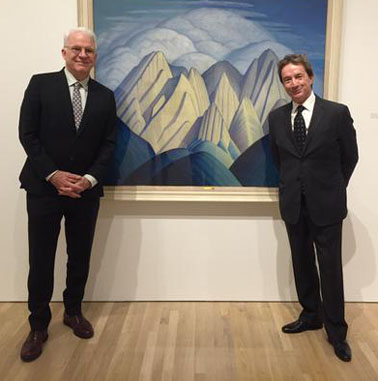
Steve Martin and Martin Short in front of one of the Lawrence Harris Canadian paintings that Steve Martin is promoting at the Hammer Mueseum in Los Angeles.
Finally, the day after November 4 (November 5) also marks the birthday of Harold Adams Innis in 1894 – 121 years ago – on a family farm near Otterville, Ontario, north of Lake Erie. And, as yet another reliable enough Wikipedia article has put the matter : “Innis (… November 5, 1894 — November 8, 1952) was a Canadian professor of political economy at the University of Toronto and the author of seminal works on media, communication theory and Canadian economic history … Despite his dense and difficult prose, many scholars consider Innis one of Canada’s most original thinkers.” As I have argued myself, in another context : “Between the two world wars” Harold Innis also “helped crystallize the intellectual beginnings of a Canadian political future beyond the declining and falling British empire (which Lester Pearson and then Pierre Trudeau would start to bring to life in the world of practical politics, in the 1960s, 1970s, and early 1980s) …”
Other notes on Trudeau and Menand
* POST MORTEMS. Â I especially liked two more or less immediate post mortems on the Canadian events of October 19, 2015 :
— Â Susanna Kelley’s “Stephen Harper Was Ballot Question: Canadians Rejected Him .. And His Divisive Vision Of Canada,” on the Ontario News Watch site ; and
— Éric Grenier’s “Post-election polls suggest reasons behind Trudeau win … Change and strategic voting helped the Liberals, while the Conservatives could not appeal outside their base,” on the CBC News site.
* CONSERVATIVE MAJORITY IN THE UNREFORMED SENATE OF CANADA? My first instinct is to urge that the difficulties Jordan Press alludes to in his otherwise shrewd Canadian Press piece, “Conservative majority in Senate could give Trudeau problems in passing bills” will be modest and transitory.
But then I remember that C.E.S. Franks, eminent authority on the Parliament of Canada, has argued in yet another context that “Randall White accurately describes the mixed reactions to the Senate’s role in the free trade issue : ‘When Brian Mulroney’s new Progressive Conservative government came to office, it complained, with at least some justice, of harassment by the continuing Liberal majority in the Senate … Â On the other hand, there are Canadians who still believe that the unreformed Senate, with its unelected Liberal majority, did indeed live up to its highest responsibilities as a body of sober second thought in 1988, when it helped precipitate a federal election over the Canada-US Free Trade Agreement.’”
All this, of course, was before the particular depths to which the unreformed Senate of Canada has sunk during the years of the Harper Conservative government – which, ironically enough, was supposed to be dedicated to the old Alberta cause of Senate reform. It was also before Justin Trudeau’s low-key (and very minor) non-constitutional Senate reform of releasing Liberal senators from their commitments to the Liberal caucus, based in the democratically elected Canadian House of Commons.
As matters stand, Jordan Press seems closest to what may or may not lie ahead when he quotes an anonymous “Conservative senator” who “said an acrimonious Senate would only reinforce the popular narrative that the place is packed with partisans who are not interested in critically reviewing legislation, the upper chamber’s traditional role of sober second thought.” In some ultimate end game Justin Trudeau could also, Mr. Press points out, quickly fill all 26 Senate seats that will be vacant by the end of 2016, and secure some kind of new Liberal majority in the so-called upper house (even if it is formally unattached to the Liberal caucus in the House). And political facts of this sort should give the new Trudeau Liberal government as much weight and heft as it needs in negotiating Senate passage of its legislation.
* A LAST QUICK BOW TO LOUIS MENAND. The more I think about Louis Menand’s three  brilliant “Art and Thought in the Cold War” lectures just after the great Canadian election, the happier I am that I heard them.
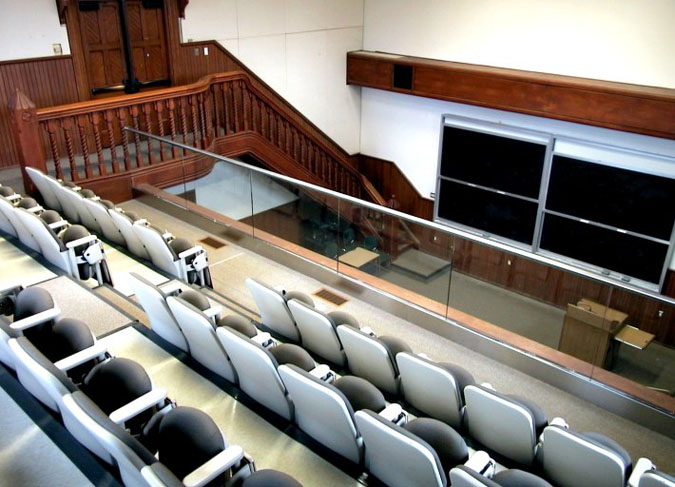
Room UC140, University College, University of Toronto. The best seats are in the balcony, shown in the foreground. But the speaker’s lectern is downstairs, on the right here. The main entrance is through the door to the balcony, on the left. There are also some wonderful high windows (albeit with a few unfortunate blinds), at the back and to the right as shown here.
He is a popular speaker for various occasions and it is easy to see why. He is entertaining as well as instructive, and you leave his talks feeling that you have communed at least briefly with some deeper level of the universe. He ended each talk at room UC140 on a dramatic and often amusing note : with the foreign policy realist Hans Morgenthau’s ultimate proposal of marriage to the critic of totalitarianism Hannah Arendt, and her rejection on the grounds that he did not “understand people” ; or with a curt note from literary critic Lionel Trilling to former student Allen Ginsberg, explaining how much Mr. Trilling disliked Ginsberg’s Howl poems – which would go on to make Ginsberg about as rich and famous as a poet can be in our time (not counting rap artists and so forth in America today, or even Drake in Canada).
It is also yet another mark of the new digital communication influence, I think, that even very unrepentantly belles-lettres practitioners of the academic lecturers’s art today use giant slides and even audio to decorate and extend their traditional oral presentations.
At one point Louis Menand offered a giant slide of the Jackson Pollock painting known as “Lavender Mist.” He noted that the title had been suggested by Clement Greenberg, who was very interested in jazz. And, as it happens, there is a Duke Ellington tune called “Lady of the Lavender Mist.” Maybe, Mr.Menand suggested, this Ellington tune is the ultimate origin of the title of the Jackson Pollock painting. And just in case all this speculation made sense, Menand also played the opening bars from the Duke’s own recording of “Lady of the Lavender Mist” – starting with a neatly constructed Ellington piano introduction, leading to Johnny Hodges’soaring alto saxophone on the melody line of a dense orchestration … Â Suddenly it seems like you’re in the middle of the Jackson Pollock painting, sitting in the balcony of UC140.
* JUSTIN TRUDEAU’S JUST WATCH ME NOTE FROM 2013 : Finally, in case you haven’t bumped into the details of this somewhat intriguing story elsewhere, here are a few key paragraphs from the gospel according to the Canadian Press (and the Toronto Star) :
“Michael Kydd was on a Porter Airlines flight on March 20 that year [2013] and passed a note to Trudeau, whom he had never met, asking ‘Can you really beat Harper?’… Trudeau responded with a quote from his late father … ‘Just watch me’… The note, which was posted on eBay, sold this afternoon for a total of $12,301 … Kydd told the Star that after holding it … for years, he decided to sell it after the picture … started trending after the election … after talking to the highest bidder, a Montrealer who … wishes to remain anonymous but has an ‘amazing story,’ he knew the note had wound up in the right hands.”
The Canadian Press/Toronto Star report goes on : “Kydd said he tweeted the message at the time and heard about it from Trudeau during a chance encounter near the Chateau Laurier Hotel two months later when he was on business in Ottawa … Kydd said Trudeau seemed to recognize him and asked if he knew him from somewhere … Kydd replied, ‘How does Just watch me on an airplane sound?’ … ‘He poked me in the chest and he was laughing and he said, you have no idea how much trouble you got me into with the Liberal Party of Canada over that’ … Kydd said he told Trudeau that he, too, had heard about it from Conservatives.”
Something in this story does seem to be saying something about the kind of Canadian prime minister Justin Trudeau will be. But at the moment it still seems hard to say exactly what it is. And that may just be what will finally keep the next four years in Canadian federal politics interesting … whether various bangable contemporary American feminists start to care or not!
